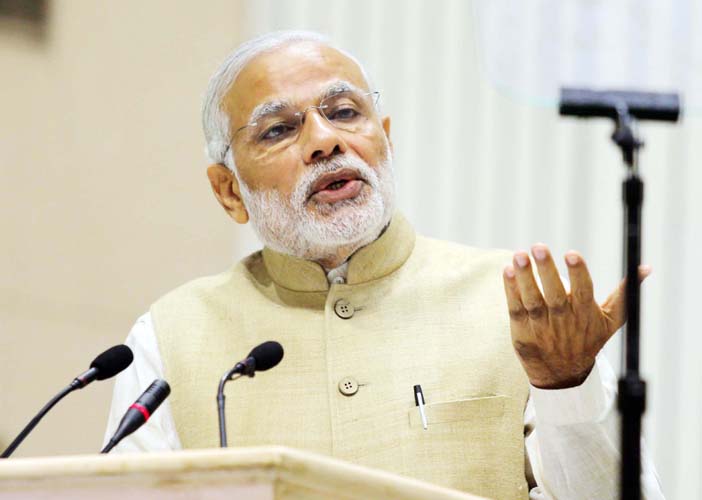
NEW DELHI, Nov 6: Prime Minister Narendra Modi today said economic reforms have to be inclusive and broad-based, aimed at improving the lives of people and not focused on just grabbing the headlines.
Addressing a gathering of economist at the 6th Delhi Economics Conclave, Modi said that efforts of the government to bring back black money stashed abroad have unearthed Rs 10,500 crore.
“India is doing better than when we took office 17 months ago. GDP growth is up and inflation is down. Foreign investment is up and CAD is down. Revenues are up and interest rates are down. The fiscal deficit is down and the rupee is stable. Obviously this did not happen by accident… This success is a result of a series of well thought policies,” he said.
Recalling various initiatives taken on the economic front, Modi said the government has endeavoured to pursue “inclusive and broad-based reforms” stressing it is a “marathon and not a sprint”.
“My appeal to all of you is to think beyond conventional remedies. We should not limit our ideas of reforms to few standard notions. Our idea of reform should be inclusive and broad based. The goal of reform is not better headlines in the pink papers but better lives for our people,” he said while inaugurating the Conclave being attended by economists from India and abroad.
On measures being taken to check corruption, Modi said I-T department would introduce a system of online scrutiny of returns and modify the performance appraisal proforma of officials to motivate them to pass correct orders.
Observing that the government is taking several steps to serve the honest tax payers, he said that this year 91 per cent of electronic returns were processed within 90 days as compared to 46 per cent last year. Nearly 90 per cent of refunds were issued within 90 days.
Modi said: “I have also instructed that the performance appraisal system for Income-Tax Officers be changed. The appraisal should reflect, whether or not the officer’s orders and assessments have been upheld on appeal. This will deter corruption and also motivate officers to pass correct orders.”
He said the Government has taken “decisive steps” to curb the corruption menace that constrains growth.
These initiatives include reforms in the working of the state-owned banks, removal of discretion in allocation of key resources like coal, spectrum and FM radio, doing away with the interviews for lower-level jobs and introduction of electronic filing and scrutiny of tax returns, he said.
Talking about illicit funds stashed abroad, Modi said: “Our campaign against tax evasion and money laundering is well known. Rs 6,500 crore was assessed before the new black money Act was implemented. Additionally, over Rs 4,000 crore has been declared under the new Act. Thus over Rs 10,500 crore of black money from abroad has been detected and assessed.”
Referring to the policies of the government, especially financial sector reforms which include JAM (Jandhan-Aadhaar- Mobile) trinity, Modi said that they were aimed at alleviating poverty.
“…Empowering the poor is far more effective than empowering poverty alleviating industry. Our financial reforms empower the poor to fight poverty themselves,” Modi said, adding that in the last 17 months, the government has brought 190 million people into the banking system.
“This is more than the population of most of the countries in the world. Now these millions are part of our banking system, and words like ‘interest rate’ have a meaning for them,” Modi said.
These people have been brought into the system and they have shown that there is a great strength at the bottom of the pyramid, he said.
Accounts opened under the Jandhan Yojana today have a total balance of almost Rs 26,000 crore or nearly USD 4 billion, he said adding “clearly our financial inclusion reform has been transformational. And yet this quiet revolution has hardly been noticed”.
He also said the government has introduced healthy competition in the debit and credit card space.
“This has traditionally been dominated by a few international players… Today 36 per cent of debit cards in India are Ru-Pay cards,” he added. (PTI)

